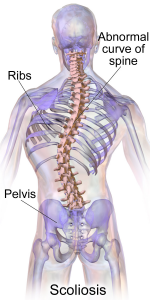Everyone has experienced the pain in their backs after carrying a heavy backpack around for a while. The relief of taking the weight off your shoulders is equivalent to sitting down after a long day of walking. As college students carrying around books for multiple subjects, the heavy backpack is sometimes unavoidable. This is never pleasant, but could this backpack be causing true damage to the back known as scoliosis?
For those of you who don’t know, scoliosis is defined as disorder where the spine is curved in the shape of an S or C, depending on the symptoms. The true cause of scoliosis has not been found, but doctors have found genetic links between members who have scoliosis.
Can a heavy backpack increase the chances of getting scoliosis? All the research and medical reports have disproved this theory. The only problems heavy backpacks can be linked with is back pain, but they do not shift the spine into the shape of an S or a C.
The good news for the kids who can’t escape the load of heavy books is that their spine is safe from an unhealthy adjustment. The bad news is that chronic back pain could be the result. An obvious way to combat heavy backpacks is lightening the load and only carrying items that are essential for class or studying.
Sources:
http://www.niams.nih.gov/Health_Info/Scoliosis/scoliosis_ff.asp
http://orthoinfo.aaos.org/topic.cfm?topic=A00633


If you take a closer look at your backpack you may notice the various straps and clips that I have noticed students around campus completely ignoring. The straps that come across your chest, lower abdomen, significantly decrease the stress the backpack is putting on your shoulders, and distributes the weight more evenly. Although strapping up may look a little strange, it will provide immediate relief for your shoulders and back.
Although heavy backpacks do not cause Scoliosis, they can cause back pain in young students. Heavy backpacks put pressure on students’ spines and shoulders causing back pain, bad posture, and muscle strains. Students can try to avoid getting back pain by adjusting their backpack straps to the appropriate length, getting a rolling backpack, organizing their school materials so less needs to be carried, and by putting the heavier items in the back of their backpacks.
Sources:
http://www.health.harvard.edu/fhg/updates/update0104a.shtml
My friend has pretty sever scoliosis and she would complain everyday that her heavy backpack that she was carrying made it worse. However, when she started carrying less books around, making the backpack lighter, it didn’t improve the scoliosis or the pain. Her final conclusion was that the weight of the backpack didn’t affect her scoliosis whatsoever, so I guess you could blame the worsening spinal disorder on a third variable.
I also did a post on this topic! If a heavy backpack does not have a direct correlation to scoliosis would the weight of a backpack be considered a soft end point? In 80-85% of cases of scoliosis the cause is unknown. That statistic raises my curiosity as to what the actual cause could be? Also how would scientists find the answer to this question?
When I was younger, I had scoliosis and it was so painful. My doctor told me I just needed to strengthen my back, so I started working out and lifting a lot more and I noticed a big difference. Not only did it help my back pain, but my scoliosis pretty much disappeared. I do notice that when I carry a really heavy backpack that I experience a lot of back pain though. I’m glad that the study you looked at showed that I can’t get scoliosis from my backpack, because I would hate to have to go through that again.
I personally have scoliosis so this post interested me, but speaking from personal experience I haven’t noticed any difference in back pain depending on the heaviness of my backpack; however, my doctor has always warned me about it so I found this post really informative!